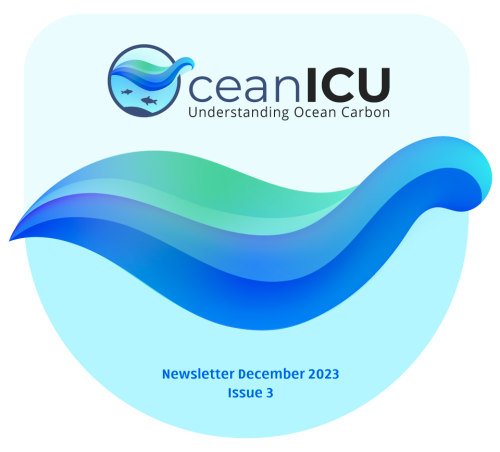
In this edition:
OceanICU is a five-year project, funded by Horizon EU and UK Research and Innovation, that seeks to gain a new understanding of the biological carbon pump and its processes to provide fundamental knowledge and tools to help policy makers, regulators and Ocean industry—fishing and mining, along with the wider blue economy—manage and understand the impact of their actions on Ocean carbon. This will ultimately lead to a better approach for addressing climate change in alignment with the EU Green Deal to reduce the net emissions of greenhouse gasses to Zero by 2050.
A Note from our Coordinator Richard Sanders
Hi everyone,
Welcome to the final OceanICU newsletter of the year. We are now 20% of the way through the project and I’d like to thank all the OceanICU team members for their hard work and good contributions.
Very recently, I was pleased to join an exciting group of OceanICU colleagues and guests at the COP28 Virtual Ocean Pavilion for a session devoted to Managing and Protecting Ocean Spaces for Climate, Biodiversity and People by 2030 as part of the COP28 Virtual Ocean Pavilion. Read about it in this newsletter.
And I was impressed with the excellent Fish Carbon webinar in November that offered a comprehensive deep dive into the present state of the ocean carbon cycle and how OceanICU is investigating the role fish and fishing may have on it. Read more below.
The quality of the lectures and presentations being given at these virtual events are first-rate, chocker-blocked with world class expertise, but as yet we are only engaging with small audiences. I hope that you can find the time to attend and learn at future webinars (there will be one every other month through 2024) and that you will pass the word around about the live events, and that video recordings and presentations are available on our website.
2024 will bring many new adventures for OceanICU team members. There will be cruises and numerical model development, progression on the highly anticipated DSTs, hands-on workshops, published papers, and I am very excited about the OceanICU Session at EGU where we will have an opportunity to present work and strengthen existing links and identify new ones across the work plans. Read more below and stay tuned for additional information about our plans for EGU in the new year.
I hope you have a wonderful holiday season.
Best Wishes,
Richard Sanders
OceanICU Project Coordinator
NORCE
Bergen, Norway

OceanICU at COP28
On 12th December, OceanICU had the privilege of participating in the closing session of the Virtual Ocean Pavilion at the COP 28 Climate Talks in Dubai: Managing and protecting ocean spaces for climate, biodiversity and people by 2030.
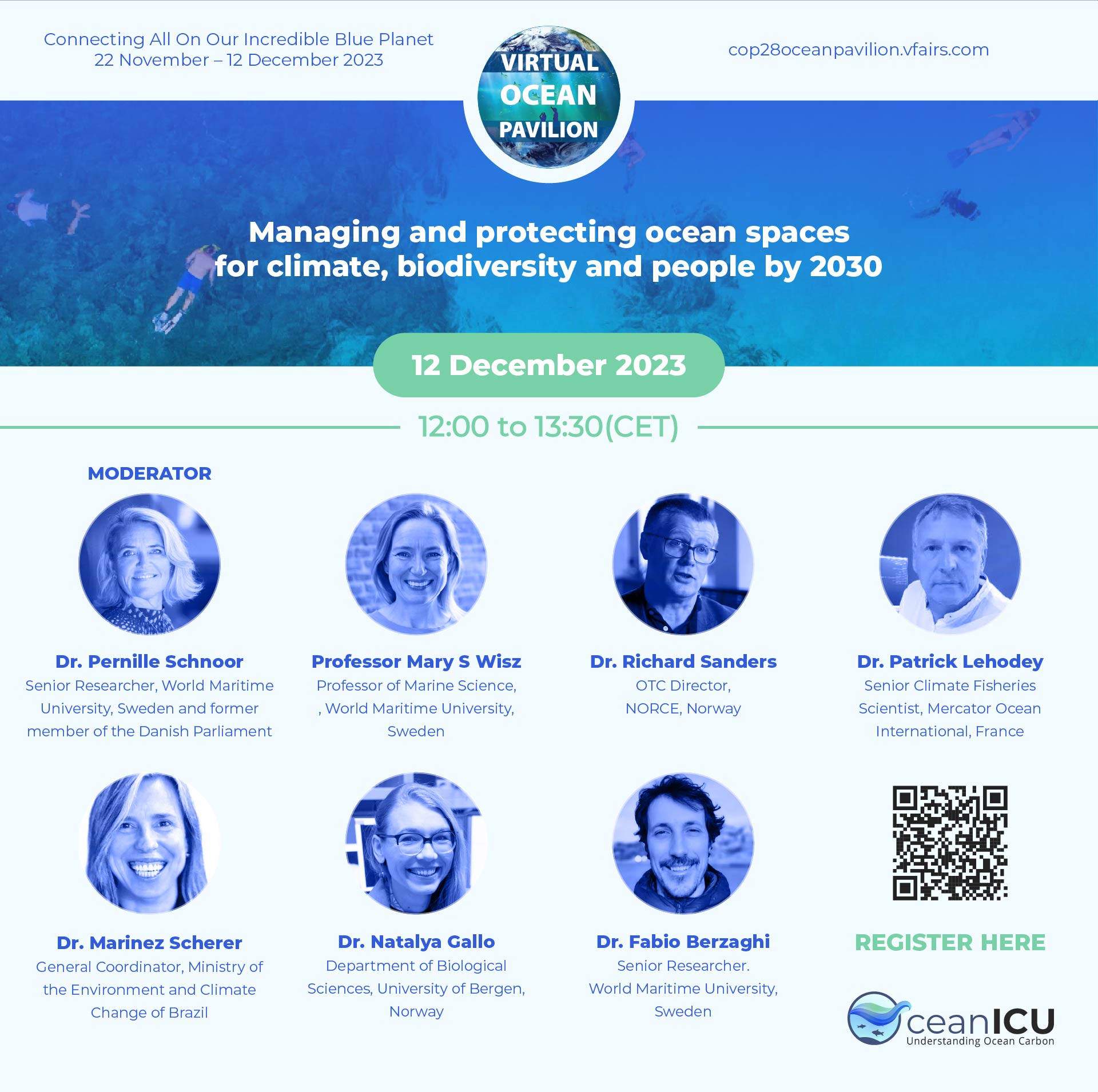
Mary Wisz and Pernille Schnoor (WMU) assembled an impressive group of experts including OceanICU colleagues Richard Sanders (NORCE), Fabio Berzaghi (WMU) and Patrick Lehodey (Mercator Ocean International) and external guests Marinez Scherer (ICZM and MSP Coordinator, Ministry of Environment in Brazil) and Natayla Gallo (University of Bergen).
The thought-provoking discussion offered a diverse range of topics relevant to the general session, including valuing ocean biological c storage, marine spatial planning, the intergovernmental process and large scale MPAs as they relate to fisheries.
The process of informing global decision makers and leaders is complex and OceanICU plans to build on this experience by mounting a sustained presence at a future COP as the project matures. If you would like to participate, please don’t hesitate to reach out to us at: hello@ocean-icu.eu.
Stay tuned for a link to the video recording of the live event which will be on the Ocean Pavilion YouTube channel, in the near future.
Fish Carbon Webinar

There’s nothing fishy about the subject of fish carbon.
OceanICU put a spotlight on the serious subject of Fish Carbon in a dedicated webinar moderated by Debbi Pedreschi (Irish Marine Institute) and featuring André Visser (Technical University of Denmark), David Reid (Irish Marine Institute) and Jacob Bentley (Natural England). Presentations and discussion focused on the potential role that fish play in the global carbon cycle, how their role may have changed as a result of fishing, and how fishery activities might be managed to maximise climate and fisheries benefits.
Anyone interested in this masterclass should watch the video recording and/or have a look at the excellent presentation deck in the post webinar digital swag bag and see the video clips of Dave, Debbi and Andre in our social media teasers.

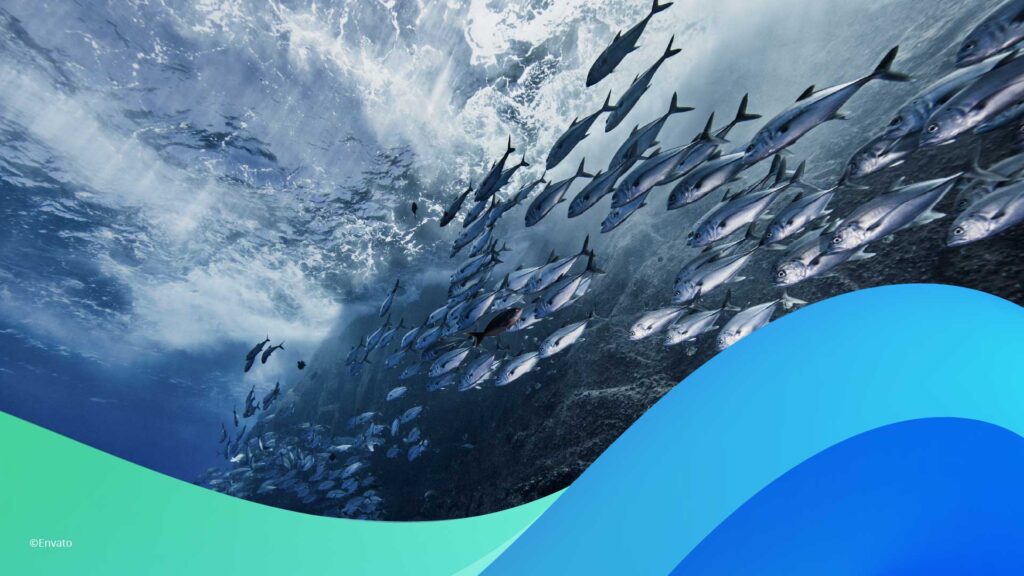
So why have we been talking so much about fish carbon?
If you want that answer and/or are interested in learning more about fish carbon and its potential impact on the biological carbon pump, check out the informative blog by Paula Silvar and Fiona Culhane from the Marine Institute, both of whom were key behind-the-scenes contributors to our fish carbon webinar.

EGU

We are pleased to announce we are convening a session at EGU in April (14-19) and are planning town halls and splinter events to explore links between OceanICU working groups and to engage with external stakeholders from industry, science and policy. Please stay tuned for updates in our March newsletter.
In the meantime, if your work concerns how the Biological Carbon Pump regulates climate, we welcome contributions in the areas of:
- Key processes in individual biomes
- Laboratory measurements of key processes
- Data syntheses integrating multiple studies
- Human exploitation impacts on flux
- Food web structure effects
- One dimensional models of key processes
- Vertical C budgets
- Seasonality of key processes
- Remote sensing based approaches to understanding key processes
- Sensor based approaches to understanding key processes
- Biological Carbon pump responses to climate change
Deadline for abstracts is 10th of January 2024
ICOS/SOCAT Workshop
on surface ocean pCO2 observations, synthesis and data products
OceanICU partners Richard Sanders, Siv Lauvset, Andy Watson and Marion Gehlen attended the ISOC/SOCAT workshop hosted by VLIZ in Oostende, Belgium in early November as part of initiative across many projects and many different international groups, working on activities along the ocean carbon value chain, specifically around measuring carbon dioxide in the sea surface.
With the increased focus on the role of the ocean’s role in regulating climate change, there is a greater demand for data concerning the ocean carbon flux, and therefore creating the need for the community of scientists involved in various aspects of the value chain to come together and plan how to deliver this data in a more effective and streamlined way.
The culmination of the workshop will be the Oostende Declaration which will be published in January.

MAST ASM – November 2023
Alex Poulton (Hariot-Watt University) raised awareness for OceanICU when he gave a presentation at MAST ASM in Scotland, discussing how the recognition of the central role of ocean biology in the biological carbon pump led to a revolution in our understanding of how it functions.
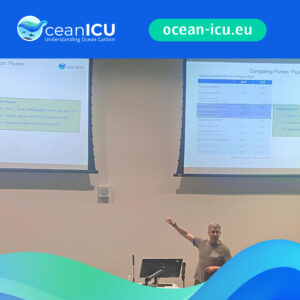
AGU – February 2024
Colleagues Andrew Watson and Neill MacKay (University of Exeter) will be presenting at The American Geophysical Union Conference as part of the Oceans Science Meeting on work relating to OceanICU. Abstracts at the below links:
https://agu.confex.com/agu/OSM24/meetingapp.cgi/Paper/1487145
https://agu.confex.com/agu/OSM24/meetingapp.cgi/Session/194299
EMODnet Open Conference
The OceanICU Poster appeared at the EMODnet Open Conference as part of the Virtual Exhibition. See if you can find it in this interactive gallery
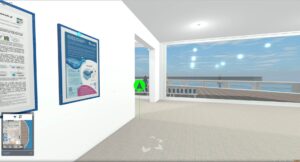

February 2024
OceanICU Webinar
18-23 February 2024
AGU, Ocean Sciences Meeting
San Francisco, USA
11-15 Mar 2024
OceanICU 2nd Annual (Virtual) Meeting
14-19 April 2024
EGU, Vienna, Austria
